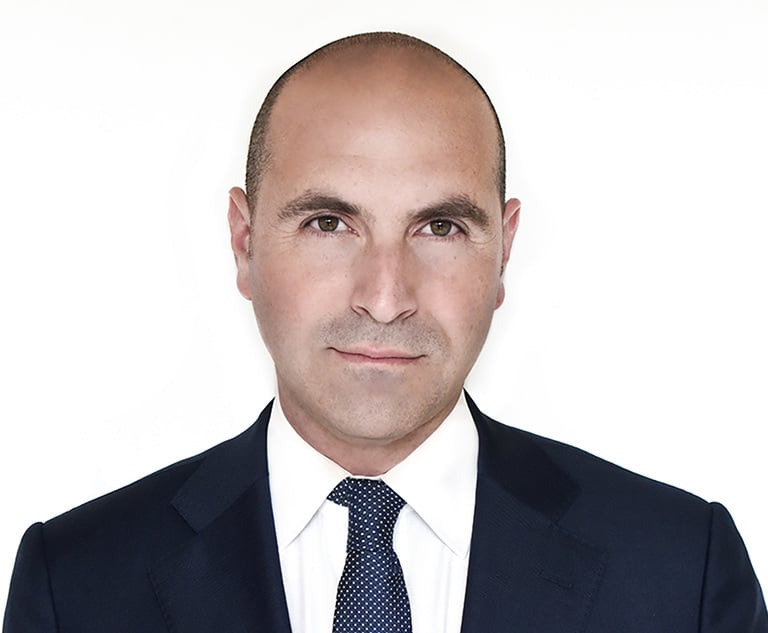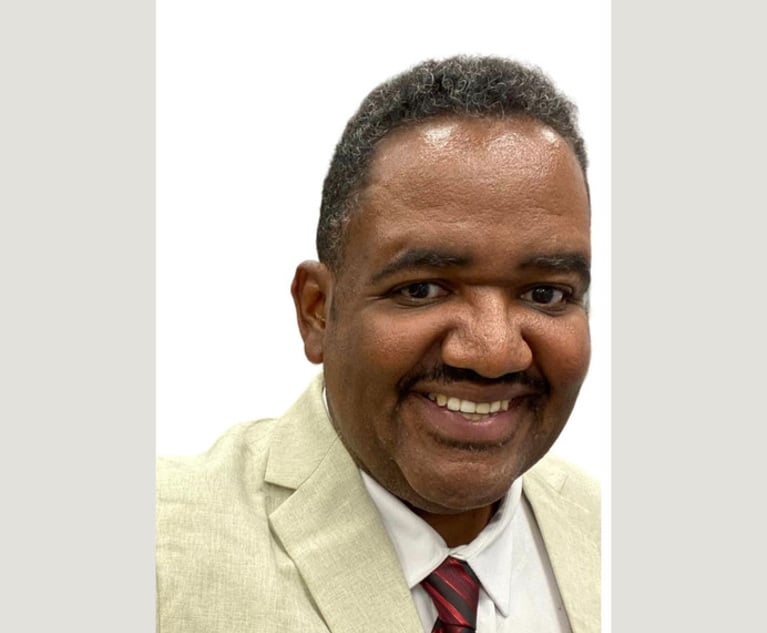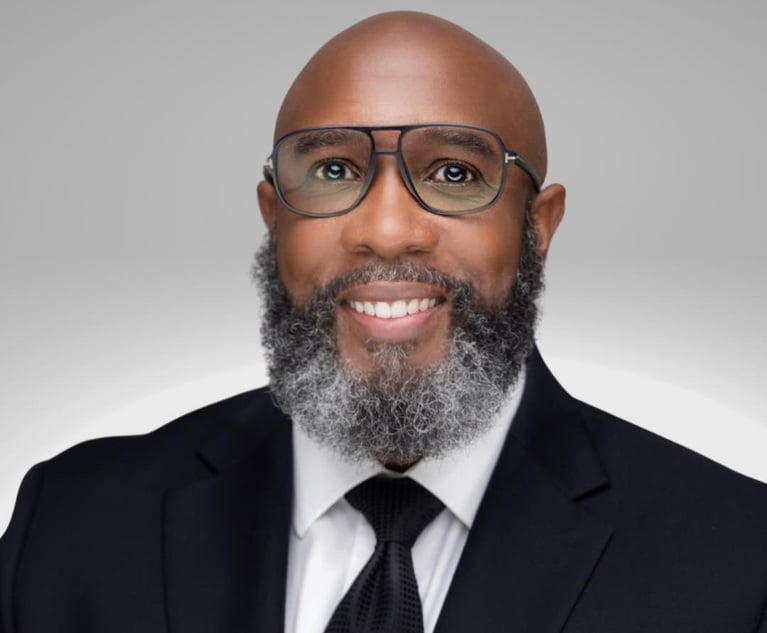Don Hayden Balances Opening a New Firm With International Arbitration and LGBTQ Advocacy
Following stints with both Baker McKenzie and Berger Singerman, Hayden started his own firm, Mark Migdal & Hayden, and has repeatedly taken up litigation aimed at increasing protections for LGBTQ individuals.
November 30, 2018 at 04:12 PM
6 minute read
 Donald Hayden, of Mark Migdal & Hayden.
Donald Hayden, of Mark Migdal & Hayden.
Donald “Don” Hayden has more than enjoyed his fair share of success. The longtime litigator and well-respected international arbitrator spent the majority of his career working at Baker McKenzie and Berger Singerman, traveled around the world and back again, and has represented big-name clients like AT&T and Google.
Yet Hayden has not been immune from the regressive thinking that can crop up in big law.
“I remember sitting in a boardroom around a table, and it was all folks from the major law firms,” Hayden recounted. It was 2003, and Hayden had already spent a number of years proving himself in Miami's legal community after a decade spent with Baker McKenzie's headquarters in Chicago. “An individual from one of the larger accounting firms came in and said how he had just been appointed to be their diversity chairman, had to go to 'some gay event' and made a derogatory comment.”
Having worked his way to the top of his field and as a gay man himself, Hayden is not particularly proud of how he reacted that day.
“I'm ashamed to say I just sat there and smiled,” he confessed. “But in the back of my head I thought 'Well, that that's one of the big four accounting firms that will never get our forensic work.”
Many significant changes have taken place since, both in the philosophies pervading law offices as well as Hayden's own circumstances and conduct.
Related story: Diversity Initiative Certifies Law Firms for Women, Minority Leadership
In 2017 he was joined by his then-Berger Singerman colleague Etan Mark and former Stolzenberg Gelles Flynn & Arango partner Josh Migdal in the endeavor of starting a new firm: the appropriately named Mark Migdal & Hayden.
“We saw an opportunity to realign things because of the way people were looking at resolving disputes and trying to address some of the concerns that clients were having,” Hayden said of he and his partner's reasoning for breaking off to found a firm of their own. Citing the exorbitant billing rates of big law, Hayden and co. have aimed to offer hourly rates that aren't upwards of $850 dollars an hour.
“At a small firm we can offer a more reasonable rate given the overhead. We're also much more nimble,” he chimed.
Even as Hayden has kept busy ensuring the success of his new boutique firm and squaring off against the likes of David Boies in federal court over Venezuelan oil, he's made it his priority to advocate on behalf of the LGBTQ community. As chairman of the LGBTQ Fund Grants Committee for the Miami Foundation, he's helped to direct funds and support towards distressed demographics within the larger group.
“We've given over $3 million in recent years to not for profits that provide services to different vulnerable populations like homeless youth and aging seniors that don't have the traditional family structures,” he said, citing that an estimated 40 percent of homeless young people identify as LGBTQ.
Aging LGBTQ individuals have dealt with a lack of support as well. ”The [LGBTQ] baby boomers that are now aging don't have the same traditional family structures because back in the day their families rejected them,” Hayden explained. Yet for all the progress he's witnessed, Hayden is realistic about the challenges of making the United States a safer and more inclusive place for LGBTQ people.
“Florida still doesn't have an equal employment statute [for LGBTQ employees] in place that has never even gotten out of committee,” he noted. “I mean LGBT people don't have any rights to equal housing, in an employment context … so we've got a lot of work to do.”
Related story: This Law Group is Providing a 'Playbook for Resistance in the Time of Trump'
To that end, he's put his skills as a litigator to good use. Perhaps most notably, Hayden served on the legal team for Janice Langbehn, who filed suit against Jackson Memorial Hospital after the Miami health center refused to allow her to visit Lisa Marie Pond, her ailing partner. The hospital claimed it was abiding by its policy which only allowed for immediate family and legally wed partners to visit patients in emergency care. As longtime partners in a state that did not recognize same-sex marriage, the hospital's protocol kept Langbehn from seeing Pond again before she passed.
Despite assembling a compelling case on grounds of tortious interference and emotional distress, Langbehn's complaint never went to trial.
“Judge Adalberto Jordan gave us a long hearing and wrote a very long opinion and indicated that if what was alleged is true, this is terrible; this should not have happened,” Hayden said. Jordan's decision to dismiss was based in part on the lack of legal protections for same-sex couples in Florida.
Although Langbehn never had her day in court, her story and Hayden's work caught the attention of those in a position to make a change.
“Based on our case, President [Barack] Obama entered an executive order that forced all medical institutions that receive federal funds to provide equal visitation policies for same sex families as all others,” Hayden said. “It dramatically changed the landscape there.”
Reflecting on the boardroom incident and representing Langbehn, Hayden was adamant that progress can peek out from the most unexpected of places.
“Last year I was at the Pride Parade on Ocean Drive and Jackson Memorial's affinity group was one of the leading groups out there,” he said. “Sometimes it takes those types of cases that tug on people's heartstrings to make changes.”
Donald “Don” Hayden
Born: June 1960, La Salle, Illinois
Spouse: Brian Thompson
Education: Loyola University of Chicago Law School, J.D., 1985; University of Notre Dame, B. A., 1982
Experience: Partner, Mark Migdal & Hayden, 2017-present; Chair, Miami Foundation LGBTQ Community Fund Grants Committee 2014-present; Partner, Berger Singerman, 2014-2017; Principal, Baker McKenzie, 1985-2014.
This content has been archived. It is available through our partners, LexisNexis® and Bloomberg Law.
To view this content, please continue to their sites.
Not a Lexis Subscriber?
Subscribe Now
Not a Bloomberg Law Subscriber?
Subscribe Now
NOT FOR REPRINT
© 2025 ALM Global, LLC, All Rights Reserved. Request academic re-use from www.copyright.com. All other uses, submit a request to [email protected]. For more information visit Asset & Logo Licensing.
You Might Like
View All
Growing Referral Network, Alternative Fees Have This Ex-Big Law’s Atty’s Bankruptcy Practice Soaring
5 minute read
Against the Odds: Voters Elect Woody Clermont to the Broward Judicial Bench
4 minute read
Miami Civil Judge Myriam Lehr to Say Goodbye to the County Court Bench
4 minute readTrending Stories
- 1The Quiet Revolution: Private Equity’s Push Into Law Firms
- 2Restoring Trust in the Courts Starts in New York
- 3'Pull Back the Curtain': Ex-NFL Players Seek Discovery in Lawsuit Over League's Disability Plan
- 4Tensions Run High at Final Hearing Before Manhattan Congestion Pricing Takes Effect
- 5Improper Removal to Fed. Court Leads to $100K Bill for Blue Cross Blue Shield
Who Got The Work
Michael G. Bongiorno, Andrew Scott Dulberg and Elizabeth E. Driscoll from Wilmer Cutler Pickering Hale and Dorr have stepped in to represent Symbotic Inc., an A.I.-enabled technology platform that focuses on increasing supply chain efficiency, and other defendants in a pending shareholder derivative lawsuit. The case, filed Oct. 2 in Massachusetts District Court by the Brown Law Firm on behalf of Stephen Austen, accuses certain officers and directors of misleading investors in regard to Symbotic's potential for margin growth by failing to disclose that the company was not equipped to timely deploy its systems or manage expenses through project delays. The case, assigned to U.S. District Judge Nathaniel M. Gorton, is 1:24-cv-12522, Austen v. Cohen et al.
Who Got The Work
Edmund Polubinski and Marie Killmond of Davis Polk & Wardwell have entered appearances for data platform software development company MongoDB and other defendants in a pending shareholder derivative lawsuit. The action, filed Oct. 7 in New York Southern District Court by the Brown Law Firm, accuses the company's directors and/or officers of falsely expressing confidence in the company’s restructuring of its sales incentive plan and downplaying the severity of decreases in its upfront commitments. The case is 1:24-cv-07594, Roy v. Ittycheria et al.
Who Got The Work
Amy O. Bruchs and Kurt F. Ellison of Michael Best & Friedrich have entered appearances for Epic Systems Corp. in a pending employment discrimination lawsuit. The suit was filed Sept. 7 in Wisconsin Western District Court by Levine Eisberner LLC and Siri & Glimstad on behalf of a project manager who claims that he was wrongfully terminated after applying for a religious exemption to the defendant's COVID-19 vaccine mandate. The case, assigned to U.S. Magistrate Judge Anita Marie Boor, is 3:24-cv-00630, Secker, Nathan v. Epic Systems Corporation.
Who Got The Work
David X. Sullivan, Thomas J. Finn and Gregory A. Hall from McCarter & English have entered appearances for Sunrun Installation Services in a pending civil rights lawsuit. The complaint was filed Sept. 4 in Connecticut District Court by attorney Robert M. Berke on behalf of former employee George Edward Steins, who was arrested and charged with employing an unregistered home improvement salesperson. The complaint alleges that had Sunrun informed the Connecticut Department of Consumer Protection that the plaintiff's employment had ended in 2017 and that he no longer held Sunrun's home improvement contractor license, he would not have been hit with charges, which were dismissed in May 2024. The case, assigned to U.S. District Judge Jeffrey A. Meyer, is 3:24-cv-01423, Steins v. Sunrun, Inc. et al.
Who Got The Work
Greenberg Traurig shareholder Joshua L. Raskin has entered an appearance for boohoo.com UK Ltd. in a pending patent infringement lawsuit. The suit, filed Sept. 3 in Texas Eastern District Court by Rozier Hardt McDonough on behalf of Alto Dynamics, asserts five patents related to an online shopping platform. The case, assigned to U.S. District Judge Rodney Gilstrap, is 2:24-cv-00719, Alto Dynamics, LLC v. boohoo.com UK Limited.
Featured Firms
Law Offices of Gary Martin Hays & Associates, P.C.
(470) 294-1674
Law Offices of Mark E. Salomone
(857) 444-6468
Smith & Hassler
(713) 739-1250







